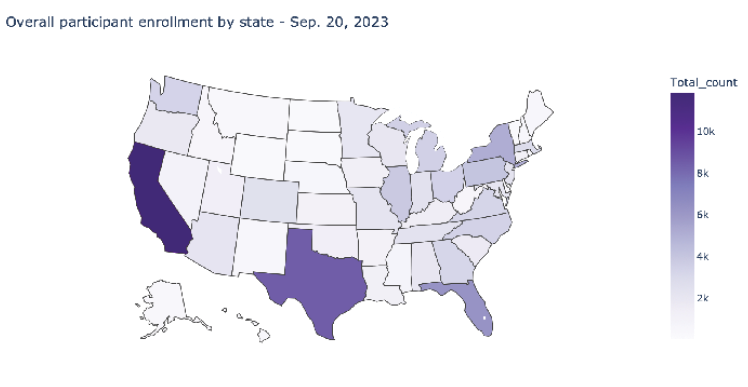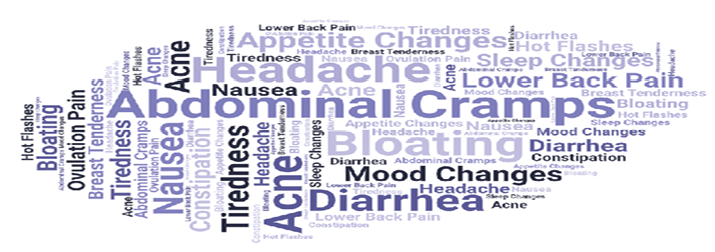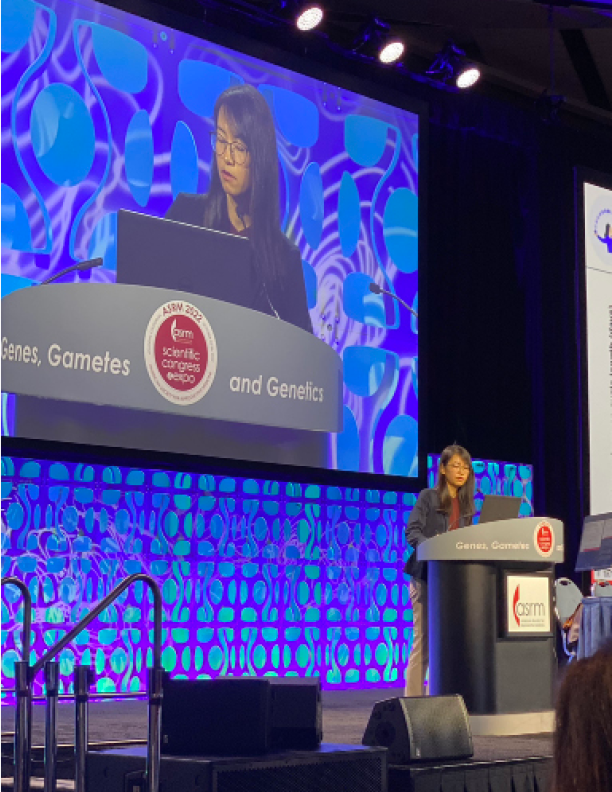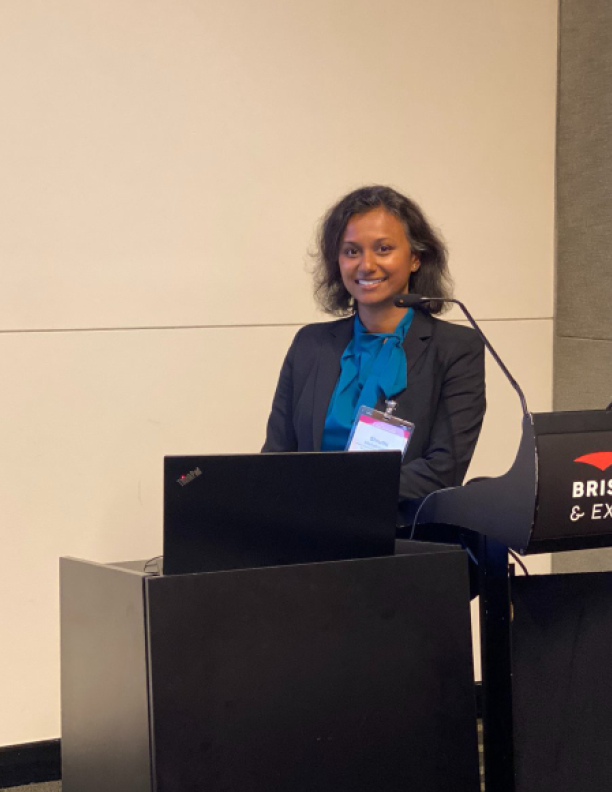Apple Women’s Health Study
The Apple Women’s Health Study is the first long-term research study of this scale and scope that aims to advance the understanding of menstrual cycles and their relationship to various health conditions.
2023 Apple Women’s Health Study newsletter: four years in review
DECEMBER 2023: The Apple Women’s Health Study shared its first newsletter with participants that encompasses achievements from the past four years.

Dear participants,
As we near the end of our fourth year, the Apple Women’s Health Study (AWHS) leadership team wants to thank you, the participants. The leadership team is comprised of faculty members from several departments at Harvard T.H. Chan School of Public Health. These departments include epidemiology, biostatistics, and environmental health. Each of us brings our different areas of expertise to study menstrual health in novel and exciting ways.
We are thrilled to celebrate another year with you! With over a 100,000 participants across the United States and its territories, Great strides have been made in understanding menstrual health since the study’s launch in 2019. Our research has explored topics such as preferred menstrual products, the relationship between endometrial cancer and polycystic ovary syndrome (PCOS), and the decline in age at menarche (first period) over a 74-year period of analysis.
Your contributions were invaluable to the progress made over these past four years. We are so excited to welcome an additional 14,767 participants who joined the study this past year. Broad representation in this participant pool will continue to enhance the validity and relevance of the study findings for individuals with menstrual cycles throughout the United States.
Your commitment drives this important research that improves the state of women’s health.
As we look ahead to the study’s fifth year, we will continue to explore the menstrual cycle with your contributions. The team will keep examining topics such as menarche, menopause, PCOS, fibroids, and endometriosis. We greatly appreciate your significant contribution to advancing not only menstrual health but also public health research.
We look forward to celebrating another successful year with you.
Kind regards,
Shruthi Mahalingaiah MD, MS
Brent Coull, PhD
Michelle Williams, SM, ScD
Russ Hauser MD, MPH, ScD
Meet the Apple Women’s Health Study cohort
With over one hundred thousand participants, it is truly inspiring to see such a large and passionate cohort advocating for and improving menstrual health research. What makes this group particularly special is the diversity of its members.
AWHS participants and their wide range of lived menstrual experiences will enable AWHS to provide valuable health insights.
Study participants range in age from 18 to 92 years old, representing the full spectrum of reproductive and post-reproductive years. This diversity allows for the exploration of menstrual health in a way that has never been possible before, with a greater understanding of the unique challenges faced by those who menstruate during every stage of their lives. We are grateful to older participants who have shared their experiences of menopause and beyond, shedding light on a topic that is less well-studied.
The AWHS cohort’s diversity encompasses not only age and location but also race and ethnicity, aligning with the racial demographics of the 2020 U.S. Census. This alignment allows AWHS researchers to explore demographic disparities in menstrual health research. Geographic diversity across the United States and its territories allows for investigating the impact of environmental factors on a person’s menstrual cycles and health. Participant experiences reflect the wide range of geographic, cultural, social, and economic factors that may help AWHS better understand menstrual health.

While each menstrual journey is unique, many often share similar experiences throughout such as menstrual symptoms and menstrual hygiene.
Menstrual symptoms are a common side effect of menstrual cycles. Preliminary analyses of data indicate that there are a wide range of menstrual symptoms within the study cohort. The team observed that the top three most frequently reported symptoms among the first 10,000 people who menstruate in the AWHS were abdominal cramps, bloating, and tiredness. Additionally, our researchers analyzed the reported symptoms across different age groups, races, and geographic locations and found similarities in the percentage of participants reporting common symptoms.

Managing menstrual hygiene is another element some participants face in their period journeys. Preliminary analysis of data of the most used menstrual products by over 7,000 participants found that tampons, sanitary napkins, and pads were the preferred choices for many individuals.
Recent findings
During the first four years of the study, our research team published five papers and released ten study updates. All of this has been made possible with the valuable contributions of participants. Check out our recent findings:
Menstrual cycle length variation by demographic characteristics from the Apple Women’s Health Study: Menstrual cycle characteristics are an important sign of overall health. With the help of over 12,000 AWHS participants, our research team examined menstrual cycle variation by age, ethnicity, and body weight. Your contributions helped reaffirm previous observations about how menstrual cycles change as individuals age and progress through different stages of their reproductive years. Additionally, we have reported new information about how menstrual patterns vary among ethnic groups and among individuals with higher BMIs.
Connecting the dots between irregular periods, polycystic ovary syndrome and endometrial cancer risk: With the help of over 50,000 participants in the AWHS, our research team explored the relationship between changes in menstrual cycles, PCOS, endometrial hyperplasia, and endometrial cancer. Researchers noted that participants with PCOS were more likely to have had endometrial hyperplasia and endometrial cancer as compared to those without PCOS. Respondents who had irregular cycles for a longer period of time (5+ years) before establishing regular cycles were more likely to have been diagnosed with endometrial hyperplasia or endometrial cancer, compared to those who had established regular cycles within one year of having their first period.
COVID-19 vaccination and menstrual cycle length in the Apple Women’s Health Study: The real-time nature of the AWHS allowed us to answer the questions about COVID-19 vaccination’s potential impact on menstrual cycles. We saw individuals share anecdotes of health issues related to menstruation on social media and were inspired to leverage science to address these concerns. We were able to demonstrate that COVID-19 vaccination caused a small change in menstrual cycle length ( +/- 1 day change, on average) and that this small change did not persist over time.
Attempts to conceive and the COVID-19 pandemic: data from the Apple Women’s Health Study: The real-time data AWHS participants submitted provided a dynamic view of the desire to conceive and how that changed throughout the pandemic. Findings from the Apple Women’s Health Study cohort suggested that people were less likely to attempt to conceive during the COVID-19 pandemic through March 2021 compared to before the pandemic. The decline in attempting to conceive was most noticeable among those with lower educational levels and lower perceived social status.
Conferences
The medical community is excited to learn more about the groundbreaking findings from AWHS. As a result, our team has been invited to numerous academic conferences around the world to share findings from the study:
♦ International Society for Environmental Epidemiology
♦ American Society for Reproductive Medicine
♦ Society for Reproductive Investigation
♦ American College of Obstetricians and Gynecologists
♦ Androgen Excess and PCOS Society
Presentations at these conferences introduce the academic medical community to our novel research and preliminary findings. Our next step is to publish in academic journals, so our findings can be used by healthcare providers and patients to improve health.


In the news
NIH Partners With Apple and Harvard University on Women’s Health Study (2019 NIEHS): The National Institutes of Health, in conjunction with Apple and the Harvard T.H. Chan School of Public Health, have unveiled a significant, long-term research alliance aimed at investigating various aspects of women’s health.
Gaining insight into women’s health (2020 HSPH): In this episode of, “This Week in Health” discusses the innovative Apple Women’s Health Study, led by Harvard Chan School researchers Shruthi Mahalingaiah and JP Onnela, aiming to enhance understanding of women’s health by collecting data from women using an Apple app to track monthly cycles and related behavioral factors.
Apple Women’s Health Study releases preliminary data to help destigmatize menstrual symptoms (2021 Newsroom): The Apple Women’s Health Study team from the Harvard T.H. Chan School of Public Health has shared a preliminary research update, showcasing groundbreaking findings on menstrual symptoms in women. This study, involving 10,000 participants of diverse ages and races across the US, demonstrates how large-scale, long-term research on menstruation can contribute to the advancement of women’s health science and reduce the stigma surrounding menstruation.
COVID-19 vaccination and menstruation (2022 Science Magazine): The Apple Women’s Health Study saw that the COVID-19 vaccination causes small changes to menstruation that quickly resolved in a publication released in March 2022.
Preliminary findings from the Apple Women’s Health Study help advance the conversation and science around menstrual cycles (2023 Newsroom): Apple Women’s Health Study researchers used survey data from over 50,000 participants to advance the scientific understanding of the relationship between persistently abnormal periods, PCOS, and endometrial hyperplasia and cancer.
Why It’s So Essential to Talk About Periods (2023 POPSUGAR): Menstruation is a natural and normal part of life for half the population, but it remains surrounded by stigma in both science and society. Dr. Sumbul Desai and Dr. Michelle A. Williams wrote an op-ed arguing that it’s time to drop the euphemisms and start the conversation.
How Wearables Are Expanding the Limits of Clinical Research (2023 Medscape): Researchers are using smartwatches and fitness trackers to do large-scale studies that would have been impossible in the past. Dr. Shruthi Mahalingaiah and Dr. Huichu Li highlight the benefits of tech wearables in menstrual cycle research.
Additional resources for menstrual health education
The Apple Women’s Health Study researchers are committed to treating people’s menstrual cycles as vital signs. We believe that menstrual health is a crucial aspect of overall health and well-being. Part of our commitment to elevating menstrual health within medicine and healthcare is returning what we learn to study participants. Overall health and well-being depend upon a better understanding of an individual’s menstrual cycle.
Here are some of the AWHS researchers’ top picks for menstrual health information:
The Office on Women’s Health (OASH): Educational information about menstrual health and cycles. This site includes information about the start of periods (menarche), what to expect with normal periods, and when to see a healthcare provider about changes in your cycle.
Girlshealth.gov: A website produced by the U.S. Department of Health and Human Services and OASH, Girlshealth.gov is designed for younger girls and those assigned female at birth (AFAB). Head to this site for easily understood, quick facts about menstruation and other important health topics such as nutrition, bullying, fitness, relationships, and feelings.
PERIOD: A global youth-driven non-profit dedicated to eradicating period poverty and stigma through service, education, and advocacy. The organization offers numerous resources on its website to provide tools for understanding menstrual cycles and health.
Menstruation Animation: Conceived by Dr. Shruthi Mahalingaiah, one of the AWHS Principal Investigators, the Mahalingaiah Lab’s mission is to convey information about the often-underrepresented themes of sexual and reproductive health. In 2022, the lab collaborated with The Living Lab at the Museum of Science to create an innovative video designed to degender and destigmatize menstruation. Given that almost half of people with periods get their first period without having learned about menstruation, the Mahalingaiah Lab’s approachable video helps families talk about menstruation, thereby avoiding the shame, fear, and discomfort that people unprepared people feel if not taught about periods ahead of time.
Team member spotlight

Dr. Zifan Wang is a Postdoctoral Research Fellow who joined the Apple Women’s Health Study research team in October 2022. She is committed to advancing women’s health and reducing disparities in this field and sees AWHS as a great opportunity to apply her knowledge and skills to the analysis of real-world data.
In a little over one year of working with the AWHS team, Zifan demonstrated her experience in analyzing population-based cohort data to identify risk and protective factors for reproductive and perinatal health conditions. This expertise and research focus makes her a vital component of the team’s success. Zifan earned her bachelor’s degree in Basic Medical Sciences from Peking University, China, and went on to earn a master’s and a Ph.D. in Epidemiology from Harvard T.H. Chan School of Public Health, along with a concurrent master’s degree in Biostatistics.
Outside of her work on advancing women’s health, Zifan enjoys reading, walking, jogging, and visiting museums in Boston.
When asked about her experience working on the AWHS, Zifan expressed her enjoyment of working with the team, stating, “The AWHS team is amazing, with individuals from various backgrounds and outstanding skills. It is a vibrant and multidisciplinary team that shares the same goal of advancing women’s health research!”
The Apple Women’s Health Study team thanks its participants for their continued contributions to public health research. For more information see the FAQ page.